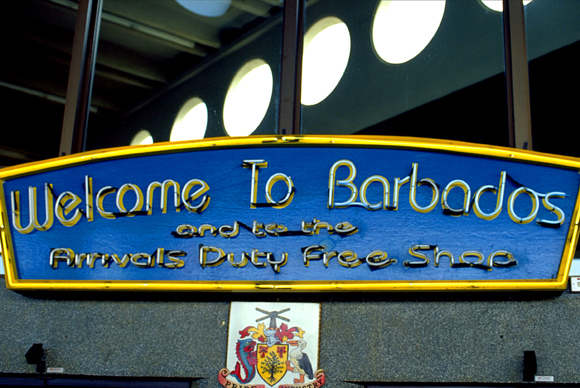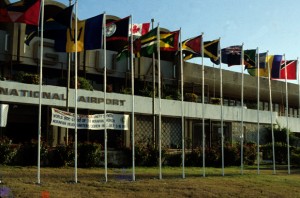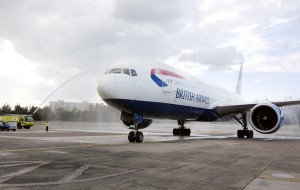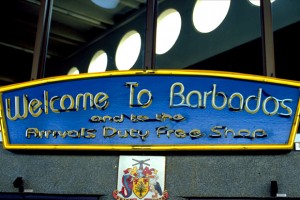Caribbean tourism officials step up lobbying campaign against U.K. airline tax

A tax originally imposed by the British government to fight global warming is being viewed in the English-speaking Caribbean as a penalty against long-haul air travelers — and regional tourism officials are furious about it.
“This tax is a travesty, it’s unfair, and it discriminates against our citizens,” fumed Hugh Riley, secretary-general of the Barbados-based Caribbean Tourism Organization, which represents 33 member nations.
“Not one pound has gone to the environment, and the British government has admitted that. It’s just a tax to pay bills,” added Alec Sanguinetty, director-general and CEO of the Caribbean Hotel & Tourism Association.
The object of their scorn is the air passenger duty (APD), which was introduced by the United Kingdom in 2004 as a way to combat climate change and reduce greenhouse gas emissions from jets.
At first, few people complained, but when the APD adopted a multi-band system in 2007, Caribbean tourism officials began crying foul. And in early April, after the tax went up an additional 8 percent, protests got even louder.
In fact, the much-hated APD was the top item on the agenda at last month’s CHTA-sponsored Caribbean Hotel and Tourism Investment Conference, held at the Sheraton Puerto Rico Hotel & Casino in San Juan.
“The cost of visiting the Caribbean is becoming so high that some potential visitors — including our diaspora — are deciding not to travel,” says the CTO in a 16-page report urging the U.K. government to either scrap or at least reform the APD. “Our data also shows that, as the proportional cost of the flight in a packaged holiday increases, our local hoteliers are often forced to lower their prices in order to save the holiday package. And where the overall package price does increase, U.K. holidaymakers can then only afford the cost by reducing their destination-spending budget. This moves the expenditure level per tourist downwards.”
Sanguinetty, a Jamaican travel industry veteran who began his career in 1960 with the long-gone British Overseas Airways Corp., said passengers flying the longest distance must now pay up to £170 ($275) on top of the normal ticket price.
“What a lot of people don’t understand is that this tax is based on the lowest class of service on the aircraft. So if you’re traveling in economy, it’s about £75. But if you’re in economy-plus, it doubles to £150,” he explained. “British Airways has a 757 which flies from London city airport to New York. It’s an old Club Class flight, so passengers pay £75. But if they fly club class out of Heathrow or Gatwick to New York, they pay £150 tax because those aircraft have multi-classes. It’s discriminatory.”
Put another way, this means that in addition to the cost of the ticket upgrade, a family of four must now pay an extra £300 ($485) in taxes to upgrade from economy to premium economy “for relatively minor improvements in seating and service.”
Arrivals plunge
As a result, argue CTO officials, air arrivals from Great Britain to the Caribbean dropped an average 16.4 percent in 2010 compared to 2009 figures — prompting British Airways, Virgin Atlantic, Easyjet and several other airlines to lobby London to urgently revise the current four-tier pricing arrangement.

The English-speaking nations of Antigua & Barbuda, Grenada, St. Lucia and St. Vincent have also been hurt by this tax. (Credit: Larry Luxner)
“The current APD system places the Caribbean at a competitive disadvantage to holiday destinations in the U.S. because they were placed in different bands,” says the report. “South Florida and the Florida Keys as a part of the United States are in a lower tax band than the Caribbean, even though the Florida Keys are, for example, around 250 miles further away than Bridgetown, Barbados, and approximately 380 miles further away than St. John’s, Antigua.”
Some say the band system should be done away with altogether.
In fact, the CTO study argues, “the option of a flat rate is more intellectually robust, as there is no argument for differentiating between destinations on account of distance. However, in recognizing the U.K. Treasury’s desire for a revenue-neutral solution and the U.K. industry’s need to retain its competitiveness at a European level, the Caribbean has chosen not to put this option forward.”
Says Sanguinetty: “We know from airlines serving the Caribbean from the U.K. that their ethnic market has dropped by 20 percent. That’s a lot of money to lose, because a lot of them stay in hotels. Virgin Atlantic cancelled their two flights into Kingston, partly because of the tax. And British Airways had 12 flights a week going to Barbados. Effective Apr. 1, they reduced that to seven.”
The islands most affected by the APD are, of course, the ones most dependent on visitor arrivals from Great Britain.
At the top of this list is Barbados, where flights originating in the U.K. accounted for 38.7 percent of the 567,700 stopover arrivals in 2008. That translates into expenditures of $683.2 million. Reducing that by 5 percent means an economic loss to Barbados of $34.2 million a year.
The APD has also had a severe impact in Jamaica, where flights from the U.K. comprised 10.7 percent of the 1.76 million stopover arrivals in 2008 — translating into expenditures of $378.6 million. The English-speaking nations of Antigua & Barbuda, Grenada, St. Lucia and St. Vincent have also been hurt by this tax.
In the case of Barbados, U.K. government figures suggest that a 20 percent decline in arrivals to Barbados could equate to $136.6 million, or about 4 percent of GDP.

British Airways, Virgin Atlantic, Easyjet and several other airlines are lobbying London to urgently revise the current four-tier pricing arrangement. (Credit: © Mauricio Pascual)
Government should ‘come clean’
A survey taken by the CTO in 2010 revealed that 71 percent of economy-class visitors said they would quickly lose interest in traveling to the Caribbean should airfares rise above £550. This is significant, said the organization, because those using economy class account for 75 percent of all travelers.
“A comparison of CTO stopover arrivals figures for 2008-10 reveals an average decline of 18.7 percent from the U.K. market compared to an average decline of 6.5 percent in total stopover arrivals. This confirms that the declines in the U.K. market have been much greater than those from other key source markets,” said the study.
“The fact that non-Caribbean stopover visitors [including those from France, Italy and Spain] have increased by an average 15.7 percent while the U.K. market has seen a decline of 6 percent in the first nine months of 2010 suggests” that the APD is to blame.
At the very least, say Caribbean officials, the British government should come clean and stop pretending that its airline passenger duty is a weapon in the larger battle against global warming.
“APD is a tax on people taking holidays, visiting friends and relatives or making business trips rather than a tax on emissions,” said the study. “As a result, the Caribbean does not believe that APD should continue to be classified as a green tax, as this misleads consumers about the intention of the tax.”
For the CTO’s Riley — whose native Barbados was a British colony for more than 300 years before it won independence in 1966 — the APD is an all-around bad idea.
“The Caribbean has never said the U.K. government doesn’t have a right to impose a tax for whatever reasons it considers important,” he told us. “But in this case, it is purely and simply to raise revenue. It places us at a competitive disadvantage and creates an additional hardship on the Caribbean diaspora, who travels back and forth several times during the course of a year. The tax can be redesigned to remove that discriminatory element and still deliver the budgetary objectives the U.K. is aiming for.”




